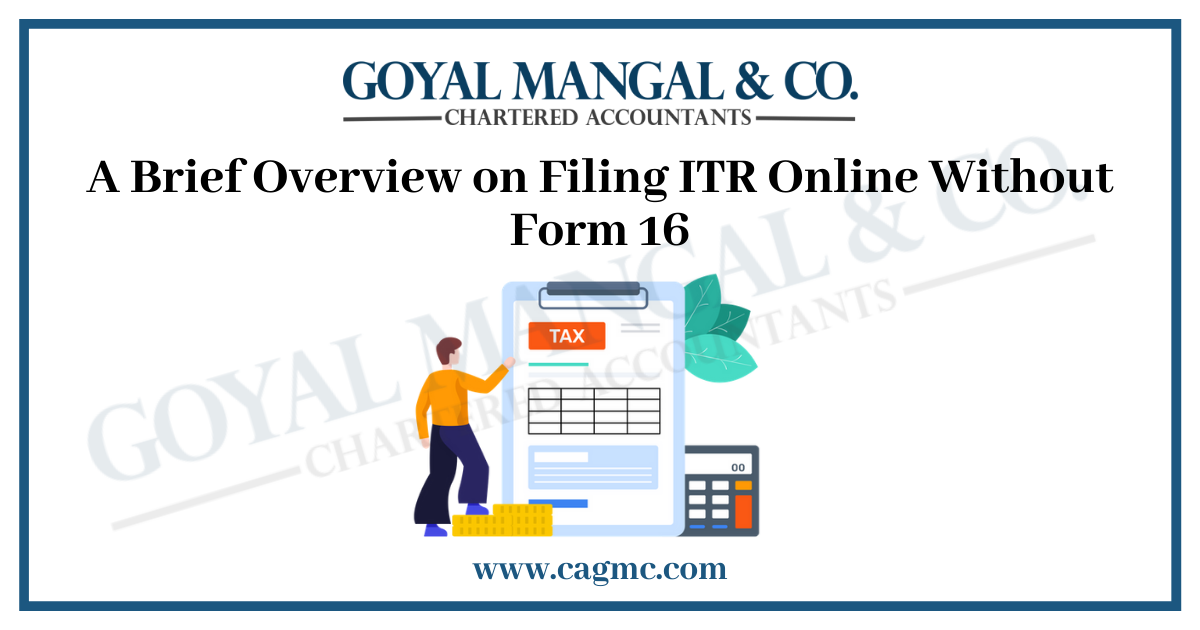
Form 16 is a TDS certificate that lists out the taxable income to be paid to the government thus, every employee/ salaried individual has to obtain Form 16 from employer to file an Income Tax Return (ITR) every year. Contingent upon the employer has to provide with the Form 16 and in case of non-providence the employee can still file the return with the help of salary slips of the employee.
Such course shall rise when the working company of the employee shall face closure of the business or arise due to the resignation of the employee without compiling the exit formalities.
|
Table of Contents: |
Introduction
Form 16 is an important document given by the employer to every salaried individual for filing Income Tax Return (ITR). The employer irrespective of the provided duty denies or couldn’t provide the employee with the Form 16 the salaried individual shall be eligible to apply for Income Tax Return (ITR), such situation may arise due when the employer is closing his business. Thus for claiming Income Tax Return without Form 16 one can use several documents and opting various procedures which are discussed below –
Filing ITR without Form 16
Step 1 – Salary Certificate
The main source of information for computing Income Tax Return without Form 16 is through salary slips.
The details to be compiled in a salary slip as per Income Tax Act, 1961 are –
- Section 17(1) Gross salary
- Section 17(2) Value of perquisites
- Section 17(3) Amount of profit in lieu of salary
- Section 10 Exempted allowance
- Deduction (Standard deductions, Entertainment allowance, Professional tax)
Apart from the information provided the salary slip reflects the value of all the paid allowances, deductions such as provident fund (PF), tax deducted at source (TDS), HRA etc.
Step 2 – TDS deducted with Form 26 AS
Form 26AS must contains the details of deduction and calculation by the employer over the year and match the amount mentioned. In case of dispensary in the calculated TDS amount it has to be intimated to the employer and error has to be rectified.
Step 3 – deductions under House Rent Allowances (HRA)
The employees get the privilege of availing house rent allowance (HRA) deductions from their salary. To claim HRA the employee has to submit the rent receipts to the pay roll department. In case of non claimant from the employer the same can be claimed while filing for Income Tax Returns.
Step 4 – deductions in accordance with Section 80
Employees are eligible for an exemption from paying tax while they incur expenses incurred Under Section 80 such as –
- Section 80 C – life insurance, employee provident fund, etc.
- Section 80 D – Medical insurance premium etc.
- Section 80 E – Interest on education loan etc.
Step 5 – Income from other sources
If the employee acquires any additional income apart from their salary such as interest from fixed deposits, income from rent, it must be included as taxable income.
Step 6 – computing total taxable income
The final stage is computing the taxable income of a salaried individual is by subtracting deductions and setting-off/ carrying forward such incomes acquired other than earned salary. The final amount which is acquired will be the total taxable income of an individual and the same shall be filed under Income Tax Return (ITR 1, ITR 2 or ITR 3 as applicable)
Circumstances under which ITR 1 can’t be filed
- On any event if the taxable individual has sold their securities/ properties/ shares etc.
- Holder of an unlisted shares
- Posted as a director of the company
- Owning more than one house
- Having an agricultural income more than INR 5,000 /-
- Having a status of Non Resident of India (NRI)
- Income acquired from horse race or lottery income.
If the taxable individual falls under either of the above mentioned list then he/ she is entitle in filing their Income Tax Return under Form ITR 2 or ITR 3.
Final words
Though it seems filing of Income Tax Return is impossible for salaried individual without Form 16, it still can be filed by updating the details in ITR 1/ 2/ 3 according to the nature of income acquired by an individual apart from the monthly earned salary. Notwithstanding the earned salary yet, it is also the duty of the individual to correctly disclose the amount with all deductions and set off or carry forwards if any.


